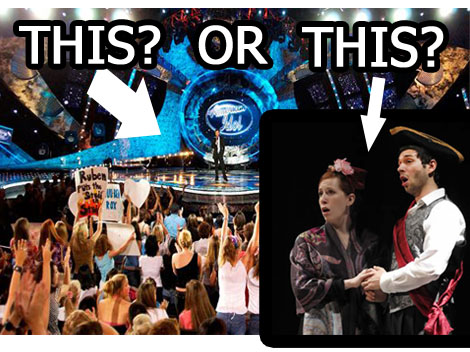“...BUT MOM, I DON'T LIKE CLASSICAL MUSIC!!!”
By Hannah Harrow on August 30, 2012

In the same way, we must learn to like- acquire a taste for- classical music- because it’s good for us. I won’t say it was easy, even for me, a kid with two classical musicians for parents! But now I’ve ended up at a classical music conservatory, studying classical vocal performance and opera! (And yes, I used to say to my mom, “I hate opera!”)
Maybe it’s hard to like classical music because we live in a culture that trains us to expect immediate gratification, even in our musical experiences. Shows like American Idol and Britain’s Got Talent have reduced the art of music to pure entertainment. Who wants to put forth the effort to attend an opera sung in a foreign language when you can sit at home and enjoy watching (and laughing at?) mostly untrained and untalented singers making fools of themselves on national television? Sadly, not many. Will anyone be in the audience when I sing in my first opera?

That's right, I didn't like classical music. It wasn't cool. Or fun. Or entertaining.In fact, I thought it was just plain bor-ing. Like a typical tween or teen, the music I liked was Christian Contemporary rock, or whatever entertained me, or whatever I heard on the radio, or whatever my friends had on their Ipods. Essentially, whatever pop culture fed me.
Now, don't get me wrong, there is nothing wrong with most popular music, with artists like the Newsboys, or Casting Crowns or Michael W. Smith. (We enjoy their music ourselves!) However, limiting our musical tastes to only what is immediately easy and fun to listen to is like limiting our diets to the McDonald's dollar menu. For instance, as kids, my siblings and I didn't like broccoli. But did our parents pat us on the head, and say, “That's okay, honey, have some french fries instead”? Nope. We learned to like broccoli because it’s good for us. So now (for the most part) we rather enjoy it! Broccoli is an acquired taste.
In the same way, we must learn to like- acquire a taste for- classical music- because it’s good for us. I won’t say it was easy, even for me, a kid with two classical musicians for parents! But now I’ve ended up at a classical music conservatory, studying classical vocal performance and opera! (And yes, I used to say to my mom, “I hate opera!”)
Maybe it’s hard to like classical music because we live in a culture that trains us to expect immediate gratification, even in our musical experiences. Shows like American Idol and Britain’s Got Talent have reduced the art of music to pure entertainment. Who wants to put forth the effort to attend an opera sung in a foreign language when you can sit at home and enjoy watching (and laughing at?) mostly untrained and untalented singers making fools of themselves on national television? Sadly, not many. Will anyone be in the audience when I sing in my first opera?
Comments
"I don't like classical music."
Hannah,
How would you suggest introducing classical music to kids who claim to not like it? How would one even get them to listen to it?
Hi Alissa!
Hi Alissa!
What a great question. I think its worthy of its own blog post. So, I will think on it over the weekend, talk to my siblings, interview my parents, and you should see a new post up soon!
Thanks so much for visiting, reading and commenting. We really appreciate it!
-Hannah
Alissa's question: introducing classical music to kids...
Alissa, there is a new article on my blog that addresses your exellent question: http://www.hisownhandmusic.com/blogs/steve-harrow/introducing-kids-and-yourself-perhaps-art-music
Thanks for writing!
RE: good thoughts!
Hi Hannah: Excellent post! I like how you are thinking.
A suggestion for the woman interested in sharing sacred/classical with her kids. Here's an excellent resource that covers 500 years of sacred music. It's not possible to get the CDs anymore but there's great info here from a Christian standpoint. Lots of historical info. It would be easy enough to find the music to go along with what is suggested. I have several home-schooling moms who use this material and their kids like it. http://www.lutheransonline.com/lutheransonline/music/
Another easy way is to take them to concerts. Even in small towns there are band concerts. Live can be more engaging. See if your local college offers any classes.
My dad, who is not a musician, just brought records home every week. He would buy whatever was on sale. We learned a lot this way.
Diana
I will be there!
Hannah, great article and I agree with comments. For really any kind of "new" music, or food for that matter, is an acquired taste. "Expert" say that you have to try a food 10 times before you develop a taste for it. Perhaps the same with music. Small bites over time is the best recipe...and by the way, I will be there at your opera performances!
Add new comment